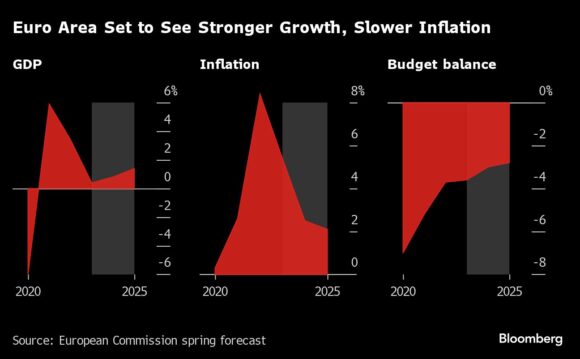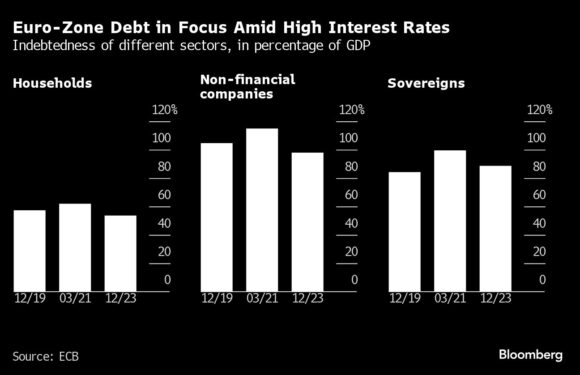Geopolitical tensions and a raft of elections around the world are heightening the risk that investors will be jolted by negative surprises and endanger financial stability, the European Central Bank warned.
Markets have so far taken a relaxed view on such threats, leaving them exposed to sudden shifts in sentiment in the event of shocks, the central bank said in its bi-annual Financial Stability Review, published Thursday. It also cautioned that European Union and national votes increase uncertainty about the trajectory for public finances.
“The scope for adverse economic and financial surprises is elevated, and the risk outlook for euro-area financial stability remains fragile accordingly,” ECB Vice President Luis de Guindos said in the report. “Sentiment can change rapidly, not least given the geopolitical environment and pricing-for-perfection which creates the potential for large market reactions to disappointing news.”
Geopolitical Risks: Why Underwriters Are Watching Aggregations
Global dangers have only increased since Russia invaded Ukraine on the euro zone’s border in 2022, with the Middle East representing the latest hot spot. Elections — including Donald Trump’s bid to return to the White House in November and European Parliament polls next month — add yet more uncertainty more to the mix.
Despite that backdrop, the chances of a soft landing in Europe have risen, as inflation eases toward 2% without a deep recession or a spike in unemployment. The European Commission on Wednesday forecast that price growth will moderate more quickly than previously anticipated, while prospects for an economic recovery will remain intact.

That means overall threats to financial stability have receded compared with the last report six months ago, the ECB said. It added, though, that question marks over government policies and economic conditions remains high.
That’s reflected in views about the path for ECB interest rates. Officials haven’t dared to commit to much beyond a highly probable first cut in June, citing the need to remain dependent on incoming data.
“Volatility in financial markets could increase significantly, should inflation deviate substantially from consensus expectations, if economic growth weakens or if geopolitical conflicts escalate further,” the ECB cautioned.
Another concern is public finances. According to the commission’s forecast, budget deficits that widened significantly due to pandemic and energy support aren’t narrowing as quickly as previously thought.

While currently enjoying relatively benign conditions on financial markets, high debt levels are leaving governments vulnerable to external shocks if they require an increase in spending, according to the ECB. The euro zone’s deep-seated economic issues, meanwhile, complicate tackling such burdens.
“Structural headwinds to potential growth, from weak productivity for instance, are raising concerns about longer-term debt sustainability, making sovereign finances more vulnerable to adverse shocks and elevating risks to the financial-stability outlook,” the ECB said.
It also warned that tight financial conditions are testing households and corporates that have so far stayed resilient to rising borrowing costs.
“This shouldn’t provide grounds for complacency, as pockets of vulnerability remain,” Guindos said. The ECB is in particular concerned about lower-income households and firms with lower credit ratings.
These challenges are compounded by recent turbulence in the real estate sector, the ECB said, though it expects the downturn to “remain orderly.”
On a more positive note, the ECB said that even if corporate insolvencies have increased to above pre-pandemic levels in several countries, “defaults and non-performing loan rates have remained relatively low.”
Photograph: Luis de Guindos, vice president of the European Central Bank (ECB), listens during a rates decision news conference in Frankfurt, Germany, on Thursday, Sept. 12, 2019. Photo credit: Alex Kraus/Bloomberg
Was this article valuable?
Here are more articles you may enjoy.



 Viewpoint: Runoff Specialists Have Evolved Into Key Strategic Partners for Insurers
Viewpoint: Runoff Specialists Have Evolved Into Key Strategic Partners for Insurers  Florida Engineers: Winds Under 110 mph Simply Do Not Damage Concrete Tiles
Florida Engineers: Winds Under 110 mph Simply Do Not Damage Concrete Tiles  AIG’s Zaffino: Outcomes From AI Use Went From ‘Aspirational’ to ‘Beyond Expectations’
AIG’s Zaffino: Outcomes From AI Use Went From ‘Aspirational’ to ‘Beyond Expectations’  Insurify Starts App With ChatGPT to Allow Consumers to Shop for Insurance
Insurify Starts App With ChatGPT to Allow Consumers to Shop for Insurance 

